Qian Chen is a Chinese-American medical scientist who is currently the Michael G. Ehrlich Endowed Chair Professor in Orthopaedic Research at the Alpert Medical School, a part of Brown University. [1]
Qian Chen is a Chinese-American medical scientist who is currently the Michael G. Ehrlich Endowed Chair Professor in Orthopaedic Research at the Alpert Medical School, a part of Brown University. [1]
Shanghai Theatre Academy is a public university in Shanghai, People's Republic of China dedicated to dramatic art education. Its predecessor was Shanghai Municipal Experimental Theatre School cofounded by the famous educator Gu Yuxiu. Its alumni include actresses Pan Hong, Li Bingbing, Xing Fei, Li Qin, Dilraba Dilmurat, Ma Yili, Xiao Song Jia, Wan Qian and Zhang Yuqi, and actors Tong Dawei, Lu Yi, Hu Ge, Lin Gengxin and Deng Lun.
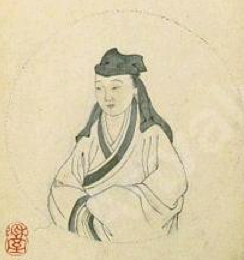
Liu Rushi, also known as Yang Ai (楊愛), Liu Shi (柳是), Liu Yin (柳隱) and Yang Yin (楊隱),Yang Yinlian (楊影憐), Hedong Jun (河東君), was a Chinese Yiji, poet, calligrapher, and painter in the late Ming dynasty and early Qing dynasty.
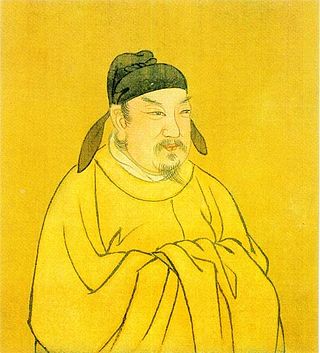
Emperor Wu of Chen, personal name Chen Baxian (陳霸先), courtesy name Xingguo (興國), childhood name Fasheng (法生), was the founding emperor of the Chen dynasty of China. He first distinguished himself as a Liang dynasty general during the campaign against the rebel general Hou Jing, and he was progressively promoted. In 555, he seized power after a coup against his superior, the general Wang Sengbian, and in 557 he forced Emperor Jing of Liang to abdicate the throne to him, thereby establishing the Chen dynasty. He died in 559, and as his only surviving son Chen Chang was held by the Northern Zhou dynasty, he was succeeded by his nephew Chen Qian.

Emperor Wen of Chen (陳文帝) (522–566), personal name Chen Qian (陳蒨), also called Chen Tanqian (陳曇蒨), courtesy name Zihua (子華), was the second emperor of the Chinese Chen dynasty. He was a nephew of the founding monarch, Emperor Wu, and after Emperor Wu's death in 559, the officials supported him to be emperor since Emperor Wu's only surviving son, Chen Chang, was detained by the Northern Zhou dynasty. At the time he took the throne, Chen had been devastated by war during the preceding Liang dynasty, and many provinces nominally loyal to him were under control of relatively independent warlords. During his reign, he consolidated the state against warlords, and he also seized territory belonging to claimants to the Liang throne, Xiao Zhuang and the Emperor Xuan of Western Liang, greatly expanding Chen's territory and strength.
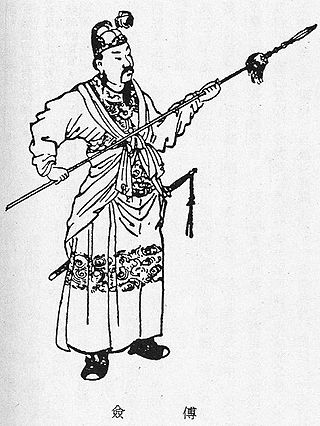
Fu Qian was a Chinese military general of the state of Shu Han in the Three Kingdoms period of China. He was a son of Fu Rong.
Qian Hong was an official of the Jin dynasty of China. He previously served in the state of Cao Wei during the Three Kingdoms period. His father, Qian Zhao (牽招), was a notable military general of the Cao Wei state.
Zhang Yao'er (章要兒) (506–570), formally Empress Xuan, was an empress of the Chinese Chen Dynasty. Her husband was the founding emperor Emperor Wu.

Emperor Fei of Chen (陳廢帝), personal name Chen Bozong (陳伯宗), courtesy name Fengye (奉業), childhood name Yaowang (藥王), also known by his post-deposition title of Prince of Linhai (臨海王), was an emperor of the Chinese Chen dynasty. He was the son and heir of Emperor Wen, but after he came to the throne in 566, the imperial administration fell into infighting almost immediately. The victor, Emperor Fei's uncle Chen Xu, deposed Emperor Fei in winter 568 and took the throne himself.
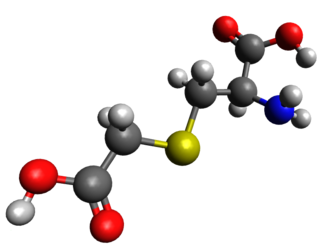
Carbocisteine, also called carbocysteine, is a mucolytic that reduces the viscosity of sputum and so can be used to help relieve the symptoms of chronic obstructive pulmonary disorder (COPD) and bronchiectasis by allowing the sufferer to bring up sputum more easily. Carbocisteine should not be used with antitussives or medicines that dry up bronchial secretions.
The politics of Guizhou Province in the People's Republic of China is structured in a dual party-government system like all other governing institutions in mainland China.

Ch'ien Mu or Qian Mu was a Chinese historian, philosopher and writer. He is considered to be one of the greatest historians and philosophers of 20th-century China. Ch'ien, together with Lü Simian, Chen Yinke and Chen Yuan, was known as the "Four Greatest Historians" of Modern China (現代四大史學家).
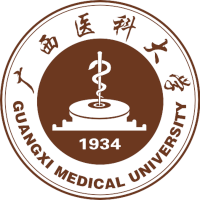
Guangxi Medical University is located in Nanning, Guangxi, China and is one of the oldest higher education medical institutions in China. In 2010, the university was voted one of the top 20 universities in China for medicine study. Clinical medicine field by the university is categorized as world's top 1%, according to Thomson Reuters Web of Science Essential Science Indicators.
Chen Qian is a female Chinese modern pentathlete who competed in the 2008 Summer Olympics in Beijing and the 2012 Summer Olympics in London finishing in 5th place on both occasions.
Chen Qian is a Chinese swimmer.
Eternity: A Chinese Ghost Story (倩女幽魂) is a Chinese period drama series produced by Taiwanese station CTS in collaboration with several other countries. It is loosely based several famous folktales such as the love story of Nie Xiaoqian and Ning Caicheng from Pu Songling's novel Strange Stories from a Chinese Studio (聊斋志异), the legend of Gan Jiang and Mo Ye and others. The cast consists of actors from China, Hong Kong, Taiwan, Malaysia and Singapore.
Jinhua Subdistrict is a subdistrict in Liwan District, Guangzhou, People's Republic of China.
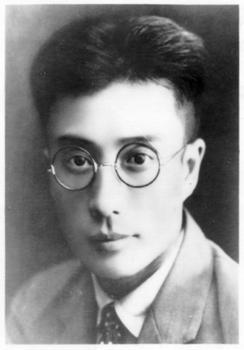
Qian Zhuangfei was a Chinese doctor, film director and a secret agent for the Chinese Communist Party. After the Kuomintang (KMT) began its suppression of the Communists in 1927, Qian infiltrated the KMT secret service, and in 1931 intercepted a telegram reporting the arrest and defection of the Communist leader Gu Shunzhang. His quick reaction allowed the Communist leadership in Shanghai to evacuate, and he was credited with saving the lives of top leaders including Zhou Enlai, later the Premier of China. Zhou called Qian and his fellow agents Li Kenong and Hu Di "the three most distinguished intelligence workers of the Party." Qian was killed in 1935 during the Long March. He was the father of Li Lili, one of China's most popular film stars in the 1930s.

Our Glamorous Time is a 2018 Chinese television series based on the novel of the same name by Ding Mo; starring Zhao Liying and Jin Han. It is set to air on Dragon TV and Zhejiang TV starting November 12, 2018.

Chunyu Yi was a Chinese physician and bureaucrat active during the Western Han dynasty. A minor official in charge of a granary in Qi, he became renowned as a healer. He is noted as an early source of case histories.